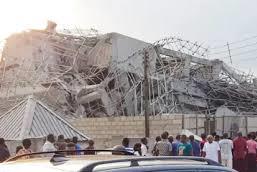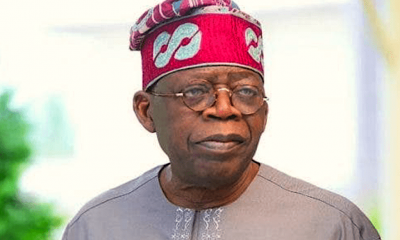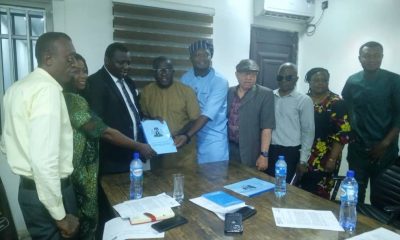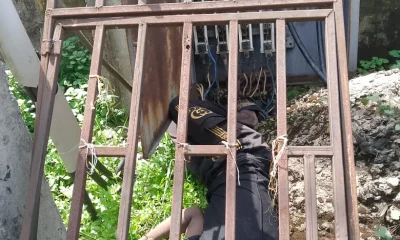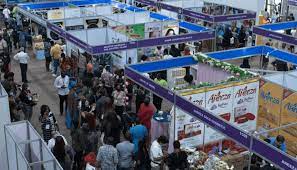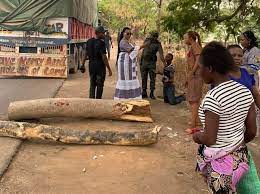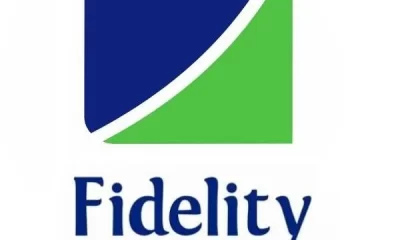Featured
INEC and Challenge of Election Management
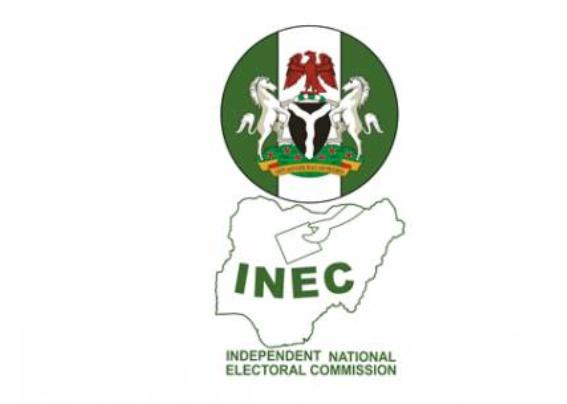
By Jude Opara
One of the hallmarks of a constitutional democracy is the ability to organize and conduct periodic elections. Elections afford the electorates the opportunity to freely choose the leaders that will preside over their affairs for a given period of time. In most countries, elections are held after every interval of four years.
In Nigeria, the body responsible for the management of elections is the Independent National Electoral Commission (INEC).
The body is constitutionally empowered to organize and conduct elections after every four years.Give it to INEC; the body has over the years been making efforts to improving the nation’s electoral system.
They have strongly pushed for the introduction of technology which has across the world shown that it has the capability of reducing electoral malpractices. We have seen the Direct Data Capturing machines (DDC), the Smart Card Reader and the Bimodal Voter Accreditation System (BVAS) to mention but a few.Attitude of Politicians
Due to the nature of Nigerian brand of politics, most elections have now shifted away from the original circle. This brings us to the challenges INEC encounters in conducting elections in the country. In Nigeria politicians usually see elections as a do or die affair ad that is why they do everything both legal and illegal to emerge victorious. The politicians have continued to device different means of manipulating the electoral system.
Their actions over the years have continued to put INEC in a very difficult situation as it struggles to deliver free, fair and credible elections. Unfortunately for the Electoral body, it more often than not takes the bashing for all the anomalies witnessed in the conduct of the exercise.
In most cases, the politicians are the ones that compromise the system in their quest to emerge victorious in elections. In fact, they see election as a game which could fall in favour of anybody, that is why all manners of people always mobilize funds to buy nomination forms. Even when they know they don’t really have what it takes to convince the electorates to vote for them, they tend to rely on engaging in one electoral malpractice or the other. But when the outcome doesn’t favour them, they will make a complete u-turn to heap the lame on INEC.
I also agree that in some cases, some corrupt INEC officials do descend to the level of manipulating the process, but that is always isolated cases. And whenever such happens, the leadership of the Commission has swiftly taken steps to arrest and prosecute such erring staff.
The average Nigerian politician can do everything whether legal or otherwise to win election. In fact, their mantra is always to ensure that you are declared the winner so that as you are sworn in, your challenger will be the one running from one court to the other seeking judgement. Yes, the idea is that as soon as the politician is sworn in, he will begin to use public funds to prosecute his case.
However, as we march into the 2023 election year, there appears to be a glimmer of hope that the mandate of the people would count eventually. The signing into law of the Electoral Amendment Bill has raised the hope and aspiration of many Nigerians that results of the next general elections may eventually count.
The benefit of having the aspiration of the voters respected cannot be over emphasized. When election results count, it has a positive multiplier effect of checking the excesses of politicians. When the politician knows that power will now derive from the electorates as against the godfathers, he will most likely struggle to work to satisfy the people by providing the dividends of democracy to them; because that is the only way they would consider returning him to the office.
In the past, the practice was to please the godfathers who will in turn organize the thugs and miscreants that have the inglorious duty of snatching the ballot box and mass thumb printing in favour of a preferred godson. That is why, the politician will instead of working to provide the necessary infrastructure, will be busy stashing his pocket with state funds. I have heard a former governor brazenly tell his people that he bought his mandate with his money. This means they should expect little or nothing from him and indeed, he gave them little or nothing in his inglorious second term.
Therefore, as we go into the next election, every well meaning Nigerian should join hands with INEC to ensure that results count because it is in the overall interest of the nation if we get our electoral system right.
Control of Security Agencies
The role of security operatives in the conduct of credible elections cannot be overemphasized. When there is adequate security, the tendency for politicians and their allies to manipulate the system will e drastically reduced. When there is security, the carting away of ballot boxes will not be easy; the involvement in mass thumb printing may not be easy also.
However, unfortunately INEC does not control any arm of the security agencies. Even those that are stationed within the Commission, they also take directives from the hierarchy of their various commissions and not the electoral body. This has been a problem INEC has been contending with over the years. In some cases, especially where the government in power is involved in the election, there have been reports of the operatives compromising and colluding with the rampaging thugs. In fact, there have been cases where people in their full uniform were seen carrying ballot boxes and aiding and abating electoral malpractices.
Electoral Tribunals
One other inhibition that has been slowing down the election management body is the absence of a legal system that can focus on election related issues. Over the years, INEC has tried without success to have a special tribunal that would be saddled exclusively with election related cases. This is so because some politicians have managed to manipulate the nation’s legal system in such a way that cases are unduly delayed.
The relationship between swift dispensation of justice and electoral harmony is the fact that when an electoral offender is promptly punished, it will serve as a deterrent to other intending offenders while making it impossible for election manipulators to benefit from their crime.
The Gullible Electorates
Take it or leave it, the attitude of the electorates is also part of the challenges INEC has to contend with in the conduct of elections. The electorates have been involved in electoral malpractice by accepting gratifications from politicians. Vote buying has become the order of the day as in most cases; many prospective voters are ready to cast their vote for the highest bidder. It is a common scene seeing people voting and snapping as evidence that would be shown to the prospective vote buyer.
INEC has been shouting against such unwholesome practices but presently, there is nothing on ground to show that anybody is really listening to them. There is indeed little or nothing the commission can do as long as the people have decided to continue to engage in these acts.
Conclusion
In conclusion, we can only as a nation get what we want. As the elections draw nearer, we should all resolve to have an election that would be adjudged to be free, fair and credible. Unless we so resolve, there are basically little or nothing INEC can do.
The commission has scored a high point by pushing for the passage of the Electoral Amendment Bill and truly from where we stand, that is the much the body can do for now. One would not be surprised if some politicians have not already started practicing how to manipulate the newly introduced Bimodal Voter Accreditation System (BVAS) which has the dual role or accrediting the voter and also keeping record of the number of people accredited.
The level of desperation politicians always display must be checked because if we get the 2023 elections right, the credit will not go to INEC alone, but to all Nigerians who would have decided to ensure that they behaved in a civilized manner like it is in other climes.
Featured
South Eastern Governors Are Collaborating to End Sit-at-home, Soludo Says
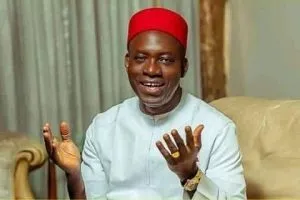
By Prosper Okoye, Abuja
The Anambra State Governor, Prof. Chukwuma Soludo, has said that the governors in the South Eastern states are collaborating to put an end to the proscribed Indigenous People of Biafra’s Sit-at-home order.
“Once we put in place the vigilante in the community, we are going to focus on opening up Anambra and ending the sit-at-home once and for all.
Because what had happened is that there are seven people pursuing a cow, but there are eight people chasing after those pursuing the cow, but now I think the reverse is becoming the case,” Soludo added in an Igbo proverb during a recent town hall meeting in Abuja.The Sit-at-home order is enforced throughout the southeastern states on Mondays, the 30th of May every year, and every other day that the leader of the IPOB, Nnamdi Kanu, is taken to court.
“Even though there are no killings in my area in Anambra, the news of the killings in other parts of the east makes people comply with the Monday sit-at-home order. People don’t open their shops in the big markets, and on the express, people don’t move freely. But in the inside areas, shops open, and people move about watching their backs,” a resident in Anambra, Ada, told DAILY ASSET.
Although the leader of the outlawed group, Emma Powerful, has denied IPOB’s role in enforcing the Monday’s sit-at-home order, and other violence in a recent media statement, the unknown gunmen still enforcing the order are tied to the group’s fighting arm, the Eastern Security Network.
However, DAILY ASSET learned that the “Unknown gunmen” are allegedly led by Asari Dokubo.
“Under former President Muhammadu Buhari, Nigeria’s Southeast region, once the most peaceful, suddenly exploded in a wave of inexplicable violence. Prisons, police stations, court houses, electoral commission offices, and random public establishments were attacked and razed by armed gangs. Individuals were kidnapped, hacked to death, or gunned down in broad daylight by hooded men who escaped without a trace. Dr. Chike Akunyili, husband of Late Prof Dora Akunyili, one-time Minister of Information and DG of NAFDAC, was gruesomely murdered by these men in an attack with no obvious aim other than to instill public fear. Many went missing and were never found, and gloom descended on the peoples of five states best known for their industry and enterprise.
“For years, not a single one of those crimes was solved, and not a single culprit was successfully apprehended and prosecuted by law enforcement operatives. Officially, fingers were promptly pointed at IPOB, the Biafra separatist organization, for every incident – sometimes even before investigations formally opened. IPOB vehemently denied these accusations, but government propaganda was too strong. Many soon believed the government and joined in demonizing IPOB for mindlessly turning the region into a war front. Gradually, though, everyone began to realize that there was something fishy in the official position.
“Federal and state authorities had all the means to nab the gangsters but preferred to issue increasingly sterile press statements instead. It soon became clear that the armed forces, police, and other official security agencies were either in cahoots with the criminals or consciously turning a blind eye to their activities. In villages across the Southeast and North Central regions, locals began to notice that whenever the Army and Police showed up for patrols, Unknown Gunmen or armed “herdsmen” followed shortly afterwards. It was as if the patrols were surveillance missions for the bad guys. So, villagers took the hint and scampered for safety whenever those who were supposed to protect them reported for duty. It was even law enforcement officials who coined the moniker, “Unknown Gunmen” (UGM) to describe criminal elements they were paid to hunt down.
“People with experience in security matters soon concluded that Nigeria was dealing with “false flag operations” – crimes deliberately committed (in this instance by secret agents of the state) to incriminate an innocent party to achieve some dark political objectives. The problem was: There was no concrete evidence or proof to show the world. Those who were supposed to gather evidence were busy covering the tracks of the criminals.
“Well, that mystery lasted until Asari Dokubo, the voluptuous and loquacious Niger Delta warlord, visited the Presidential Villa in Abuja as a guest of the new Nigerian leader, Bola Tinubu, only two weeks after the latter’s inauguration. At the end of his visit, Dokubo addressed a press conference from one of the chambers of the villa, a rare privilege accorded only to close allies of an administration.
“Unable to control his impulses whenever in front of cameras and microphones, Asari said several things that have since become subjects of controversy. One of the few which almost evaded public scrutiny holds the key to the mystery of the Unknown Gunmen. He said he was “in charge of security in six states of the federation,” and his boys were responsible for some of the successes in the security situation of the country for which the Armed forces often get credit.
“To add color to this sketchy claim, he recounted an actual operational experience in these words: “… my men and I discovered a camp in Imo with hundreds of vehicles. Where are the owners? If you want me to show you pictures, I will show you. We discovered their camp, kicked their asses, and sent them to where they belong.”
“For the avoidance of doubt, Dokubo boasted: “I am a participant in this war. I fight on the side of the government of the Nigerian state; in Plateau, in Niger, in Anambra, in Imo, in Abia, and in Rivers state and in Abuja. Today you’re traveling to Kaduna on this road, it’s not the army that makes it possible for you to travel to Abuja, or travel to Kaduna, vice versa. It is my men, employed by the government of the Nigerian state, stationed in Niger.”
“In those words, Asari Dokubo blew his own cover. He owned up to working in an undercover capacity or as a non-state actor in a sector which belongs exclusively to the Federal Government. He owned up to extra-judicial killings. He mentioned specific theaters of operation – Imo State and the Abuja-Kaduna highway. He named those who hired and paid him – “the government of the Nigerian state.” It was like a painter framing his masterpiece.
“Three of those states named by Asari Dokubo (Anambra, Imo & Abia) are in the Southeast. Two others and the Federal Capital Territory (Niger, Plateau, and Abuja) are in the Middle Belt. Another state (Rivers) is in the South-South. All named territories have one thing in common in the last few years – random, unsolved killings and attacks on members of the opposition, rural farming communities, and government facilities. Anambra, Imo, and Abia were the epicenter of unknown gunmen activities in the period leading up to the last elections. Niger and Plateau were the main theaters of operation for the so-called “Fulani herdsmen.” Kuje Prison within the FCT was attacked, and inmates set free.
“So, what exactly was Asari Dokubo’s “security brief” in a region (the Southeast) where Army and Police checkpoints adorn nearly every hundred meters of the highway? What was he doing in a state (Imo) where a special military task force was assigned to “crush” separatist agitations? What was he paid to do for a country that boasts about a dozen security agencies with hefty yearly federal appropriations? More still, what “contract” is Asari desperately lobbying to retain with the new administration of President Bola Tinubu, for which reason he broke all protocols of civility to support the Tinubu candidacy and gain his attention before and during the last elections? Why has he been so vociferous with his anti-Igbo rhetoric in courting the Tinubu camp – knowing that Igbophobia is one of the favorite weapons of the APC in its struggle to retain power after the failed Buhari years?
“If you read between the lines and fill in the blank spaces, all the fingers point in one direction – Asari Dokubo is the man behind the mask of Unknown Gunmen. He was recruited and paid by the Buhari Administration, working closely with the Imo State Governor (Hope Uzodimma), to help deal with the threat of Biafra in Southeast Nigeria by unconventional means. Asari Dokubo, in turn, recruited, coordinated, and paid the men who carried out all those killings and criminal activities to blackmail IPOB and ESN. Plus, at least some of the mysterious attacks on villagers and facilities in the Middle Belt region.
“That’s what he meant when he boldly said, “I am a participant in this war.”
The trouble with people who talk too much is that they ultimately talk themselves into trouble. Asari Dokubo has now talked himself into deep trouble – beyond being broke. Not only has he antagonized the armed forces, which he was recruited to “help,” he has also given away the identity of the evil masquerade terrorizing the neighborhood.
“In trying so hard to corner the next “security contract” after squandering what he was earlier paid for hatchet jobs under President Buhari, Melford Asari Dokubo Goodhead has given away his own secret position. He is like a drunken and unprofessional sniper who uses his weapon indiscriminately. His enemies can see clearly where the deadly shots are coming from. His position in the bushes is no longer a mystery. The sniper himself is now a sitting duck. It’s only a matter of time before he too is sniped. That’s the way the cookie crumbles,” the source noted.
Meanwhile, the Enugu State governor, Peter Mbah, has been making efforts to stop the sit-at-home order enforced in the state. This includes the threat to sanction business owners that comply with the order by closing down their businesses and calls to arrest Emma powerful.
Military Victories:
Furthermore, the military has recently announced that some IPOB fighters were killed in Delta state, while others were arrested, and arms were recovered. This announcement sparked numerous comments on social media, with most questioning the truthfulness of the report, including a tweet by Emma Powerful dismissing the report as mere propaganda against the IPOB.
Featured
Empowering Nigeria’s Tech-savvy Entrepreneurs

The growing global demand for Information Communication and Technology (ICT) services has emboldened tech-savvy entrepreneurs to grab the opportunities inherent in the multi billion dollar sector to propel the world to new heights in various areas of human endeavours.
The global demand for ICT was heightened during the COVID-19 pandemic as people relied on technology to stay connected, work remotely and access essential goods and services.
When Nigeria set up the Ministry of Communication and Digital Economy in 2019, the aim is to fully exploit the opportunities in the sector, create new businesses and jobs, enhance security and transparency and diversify the country’s economy.
The country also launched the Digital Nigeria Programme on March 19, 2020, a key initiative to empower innovators and entrepreneurs with skills required to thrive in the emerging digital economy.
This was followed by digital training for Nigerians at a time the world stayed home to combat the spread of COVID-19.
The Federal Ministry of Communications and Digital Economy partnered a number of institutions to enable Nigerians acquire cutting edge digital skills within the comfort of their homes.
Within the period, the Ministry provided Nigerians with over 280+ hours of free learning and 85+ courses on key emerging technologies like Blockchain, Artificial Intelligence, Big Data, Cloud Computing.
This is in line with the Ministry’s commitment to developing the capacity of Nigerians to use technology to solve problems. Thus, the Digital Nigeria programme helped to empower Nigerians to develop skills and build innovative solutions to tackle challenges affecting communities.
This aim is being largely achieved, because as at the second quarter of 2022, ICT had contributed 18.44 per cent to Nigeria’s GDP, making it the fastest revenue generator in the Nigerian economy
Digital and high tech savvy Nigerians had grabbed the opportunity and delved into the multi billion dollar industry, setting up businesses to drive the sector. Today, out of the seven Unicorns from Africa valued at 11.45 billion dollars , four of the unicorns, valued over 1 billion dollars each, originated from Nigeria.
According to the Minister of Communication and Digital Economy, Prof. Isa Pantami, the revolution in Nigeria’s digital economy, which began under President Muhammadu Buhari, has been remarkable.
‘‘All these unicorns in Nigeria attained this position during this administration. The first was in 2019, while the second, third and fourth attained this position in 2021.
‘‘57.14 per cent of the entire African unicorns originated from Nigeria while the market value of seven of them combined as at February 2023 is $11.45 billion, with the four from Nigeria contributing $7.5 billion,’’ Pantami said.
For clarity, Unicorn companies are those that reach a valuation of $1 billion without being listed on the stock market. It is the dream of any tech startup.
To push the boundaries of inclusiveness in the tech ecosystem, the Nigeria Startup Act was signed into law by President Buhari in October 2022. It is a bold step to institutionalise funding support for tech-savvy Nigerians.
“Today in the Act, there is a provision of supporting them financially. The government will set aside a minimum of N10 billion yearly in addition to other sources of funding that have been captured in the law,” Pantami said.
The law has also made clear provisions for tax breaks for Startups, ease of doing business, intellectual property protection and participation in public procurement, among others.
Nigeria has also raised broadband penetration now to 100 per cent following the deployment of SpaceX’s Starlink satellite Internet service. This will invariably spur more investment in ICT and its generative residue in the tech ecosystem.
However, in spite of these interventions towards making Nigeria a global talent factory in the digital space, the country’s startup ecosystem still faces significant challenges, such as access to funding, appropriate support infrastructure and skilled manpower.
‘‘These remain major barriers to the growth of the ecosystem, particularly for early-stage startups,” President Buhari acknowledged when he inaugurated a council to drive the implementation of the Startup Act.
He however said ‘‘the provisions of the Nigeria Startup Act 2022 represent an important step towards addressing these challenges and promoting the growth of a more vibrant and inclusive startup ecosystem in Nigeria.
‘‘Furthermore, implementation of the Act will lead to consolidation and further development of the gains recorded by Nigeria’s digital economy in the last four years, in the areas of contribution to GDP and increased revenue generation, among others.’’
To ensure the implementation of the Act, Buhari on April 5, 2023, inaugurated a 14-member National Council for Digital Innovation and Entrepreneurship to be chaired by the President, while the Vice President will serve as the council’s vice chairman.
The Minister of Communications and Digital Economy, will however preside over the Council in the absence of the President and Vice President.
Other members of the council are Ministers of Finance, Budget and National Planning; Industry, Trade and Investment; Science, Technology and Innovation, and the Governor, Central Bank of Nigeria.
Also on the council are four representatives of the Startup Consultative Forum, one representative each of Nigeria Computer Society and the Computer Professionals, as well as Director-General, NITDA, as Secretary.
The inauguration of the council is significant to Nigeria’s determination to remain in the forefront of the remarkable growth of startups in Africa, having already raised up to over 4 billion dollars in Startups between 2019 and 2022.
Buhari said at the inauguration that Nigeria was enticed to join the race for a slice in the sector by the remarkable growth of startups worldwide, where over 400 billion dollars of venture funding was accessed in 2022.
‘‘This growth was fuelled by a surge in demand for digital services as people worldwide turned to technology to stay connected, work remotely, and access essential goods and services largely due to the COVID-19 pandemic.
‘‘In Africa, the startup ecosystem has also been growing at a remarkable pace. In 2022, African startups raised a record of 5.4 billion dollars in funding,’’ he noted.
In this respect, Nigeria’s target has been to fully harness its youth talents, lift the country’s economy to new heights, and propel its vision and commitment towards ramping the potential of its young and innovative population in the tech ecosystem.
According to the President, the Council will also serve as a critical governance structure in the implementation of the Startup Act.
It will ensure that government agencies, entrepreneurs, investors and support organisations collaborate with the startup ecosystem to achieve the goals of promoting the growth of a vibrant and sustainable startup ecosystem in the country.
‘‘I had earlier directed the Secretariat, the National Information Technology Development Agency (NITDA) to commence the execution of the implementation plan it developed.
‘‘One of the important aspects of the implementation plan is the development of the Startup Portal, which will serve as a platform that will drive the implementation of the NSA 2022 and collaboration between all stakeholders,’’ Buhari said.
No doubt, digital innovation and entrepreneurship are prerequisites to building an indigenous digital economy, as such the Council should consolidate the gains and achievements recorded in the Nigerian digital economy sector.
According to Pantami, the Buhari administration has set three unprecedented records of ICT contributions to GDP which should be surpassed.
“For example in the first quarter of 2020, ICT alone contributed 14.07 per cent to the country’s GDP. In the second quarter of 2021, ICT alone, without digital services, contributed 17.92 per cent to GDP while in the second quarter of 2022, ICT contributed 18.44 per cent.
‘‘Annually, this administration has been setting new records when it comes to ICT contributions to GDP,’’ the minister said.
Mr Gbenga Adebayo, Chairman of the Association of Licensed Telecommunication Companies in Nigeria, said the digital economy sector has done very well.
“Today we are one of the largest contributors to the GDP, we are also one of the largest in terms of employment generation. The industry has become a driver of many other sectors of the economy.
“From the number of policies formulated by the Buhari administration, we have quantum leap in the development of the sector. We have seen rapid development of the industry,” Adebayo said.
He advised that the incoming administration should maintain and sustain the achievements in the sector, while also addressing local problems such as high energy cost, to further propel the gains in the ICT and digital economy. (NAN)
Featured
The Agony of Ikarama Community
FROM TAYESE Mike, Yenagoa
Ikarama is a Community under Okordia Clan in Yenagoa Local Government Area of Bayelsa State which is also blessed with crude oil in large quantity that have brought untold hardship and penury to them. The oil that suppose to be a blessing is more or less a curse as a community with less than hundred thousand people cannot feel the impact of their God given resources.
What a sad and pathetic situation and the agony Ikarama people are facing might not be too different from other oil and gas producing communities across the Niger Delta.
Why Ikarama case is so peculiar is because the community has witnessed the highest frequency of oil spill since 1991 and till date not much has been done to clean up the environment and proper remediation carried out within and around the community and its environment.The peaceful Ikarama Community that have been enjoying agrarian life in time past started their problem when oil was discovered in 1964 and from that time till date every valuable things to the Community have virtually been eroded due to the activities of the multinationals. Shell Petroleum Development Company started operation of oil exploration in Ikarama community and also Exxon Mobil since that same 1964 but nothing to show forth as an oil producing community.
The constant oil spills in the community has caused so much environmental pollution as the people can no longer farm while fishing activities has completely come to a halt since fish cannot survive in an Hydrocarbon polluted areas, most of the economy trees have gone into extinction while so much sickness and diseases have ravaged the community. Diseases like cancer, skin disease, infertility especially in men, blood disorder, asthma, still birth and other horrible disease due to the activities of the Oil Companies.
The Community cannot boast of a good health center, clean water and other social amenities that make life more meaningful despite the fact that every part of the community is blessed with crude oil. The recent incident that took Health of Mother Earth Foundation (HOMEF) to the Ikarama Community was the case of a young man who was trying to make a living for himself and his family hired an excavator last year to excavate the ground for fish pond but surprisingly oil was oozing out of the ground and the same experience this year after spending so much resources only to end in futility.
Visiting the community is the Director of HOMEF and his team in company of Morris Alagoa an environmental Activist to see the extent of oil pollution in the community. Dr. Nnimmo Bassey described Ikarama Community as the capital of oil spill incident in the whole of Niger Delta because Ikarama community has the highest frequency of oil spill. It’s really shocking to see the level of pollution in this community. Meanwhile we heard that shell has come severally to take samples of the soil at various depths but till date, nothing has been heard about the result been released.
Nnimmo said what really brought HOMEF to the community was to see for themselves the sad situations of a community youth who have invested so much by trying to excavate the ground for fish pond last year and this year and surprising oil was coming out of the ground. He said, they want to make sure the result of various samples shell have collected so far is been released for proper action.
Not just NOSDRA only should involved in it but Ministry of Environment at both the state and federal level should get involved in the process of ascertaining the level of contamination, not just in one location but the entire community soil because oil pipeline transverses the length and breath of the Community and in fact other Niger Delta Community “we are very disturbed by what we are seeing that plants will remain stunted for a over a year. It says a lot about what the people have to contend with and it is a sad thing that government will just be carrying on as if nothing is happening, as if Niger Delta is just a place to be exploited, this is totally unacceptable.
He described the health challenge of the people as pathetic because anywhere there is activities of oil and gas activities, oil spill, gas flair and other unwholesome activities will follow like exposing them to hydrocarbon. They will definitely have serious health challenges like skin disease blood disorder, cancer, still birth infertility especially in men amongst the rest. So the critical thing is to clean up the environment, carry out heath audit across the Ikarama Community and the rest of the Niger Delta, take measure to remove the sickness and diseases hiding in the body of the people or already manifesting and they should make sure they stop completely the oil spill and the gas flares.
Shell and other oil companies must need to carry out thorough remediation in the community. The HOMEF Director said what is going on in Ikarama and the Niger Delta can be called environmental racism and they won’t do this in their country. So we are calling for enough clean up.
As the oil companies are planning to sell of their Assets and move to deep waters, obviously they are running away from responsibility and accountability and before they move to the deep waters operation they should consult with the communities that they are leaving and must be ready to clean up the environment they have polluted over the years and carry out proper remediation and make sure adequate compensation are paid.
Seeing the pathetic situation of the people and the community environment is Mr Alagoa Morris, an environmentalist, who said monitoring the environment demanded factual and evidence-based data collection, recording and reporting. Alagoa who had written over seventy (70) reports on Ikarama oil spills called on Shell and other oil companies to be proactive when such happens for the safety of the rural dwellers, and the aquatic lives that the people depend on.





